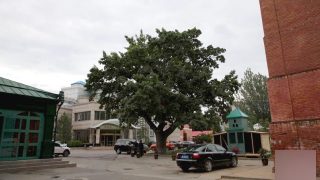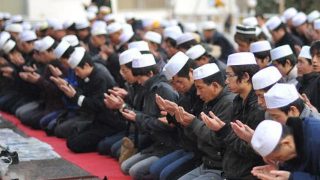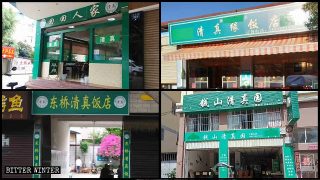In Hebei and Jilin, signboards in Arabic or indicating halal food are removed from shops and stores run by Hui Muslims, Islamic-style architecture is dismantled.
Wu Haiping
China’s government has hailed Hui citizens as the “good Muslims” or “model minority” for years. Chinese Muslim poet Ismaelan once said that “patience is a religious requirement for the Hui people;” they never liked to get into confrontations with the government, and would usually choose silence to avoid conflict. Apparently, this tactic hasn’t helped Huis to escape unscathed from the CCP’s anti-Islamic campaign, targeting their culture and traditions.
Muslim restaurants targeted, Halal symbols removed
On April 21, all ethnic Hui shops in Jianchangying town, under the jurisdiction of Tangshan city in northern China’s Hebei Province, were ordered to remove all Arabic-language symbols. Anyone refusing to follow the order was threatened with the closure of their shops. Overnight, all halal symbols were removed from the 45 Hui shops on the street.
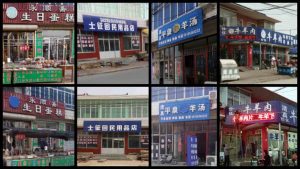
The owner of a butcher’s shop told Bitter Winter, “Now, not a halal symbol can be found in the entire Jianchangying town. Arabic-language halal symbols represent our ethnic beliefs. The state doesn’t let us believe in Islam; we’re only allowed to believe in the Communist Party.”
Halal symbols on the signboards of ethnic Hui shops in the cities of Jilin and Changchun, as well as other areas of northeast China’s Jilin Province, were also purged, heavily impacting businesses of local Muslims, some shops barely surviving as a result.
On April 10, a Muslim barbecue restaurant in Changchun city was ordered to remove Arabic-language symbols and the Chinese characters for “Muslim” from its signboard. Officials claimed that a crackdown was underway throughout Changchun, and that all Islamic symbols must go. One day later, the proprietor posted a “Business for sale” notice on the shop window.
“After the signboard was removed, our profits were halved,” the proprietor said angrily. “All of the shops opened by us Hui people must have a ‘dua’ [a Hui halal symbol] on the signboard. Without a ‘dua,’ even if the word ‘halal’ is written on a shop’s sign, no one would dare to enter it. If my mom goes out to eat, she would never go to a restaurant without a ‘dua’ on the signboard.”
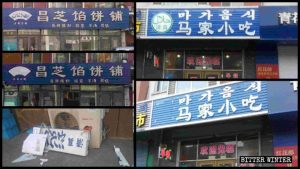
A Muslim hotpot restaurant in Jilin’s Yanji city also suffered losses as a result of signboard replacement. “This campaign is nationwide. We’re not allowed to use any symbols with religious overtones,” said the restaurant’s owner. “We’ve been using the name ‘Muslim’ for 40 years. Customers only recognize this signboard. Ever since we replaced it, our revenue has decreased by about 600 to 700 RMB [about 85 to 100 USD] per day. As we removed the halal symbol, Hui people have not come in.”
A Hui customer said that the “dua” symbol is an important symbol that Muslims use to identify halal food when they dine out. By completely removing it from restaurants and food packaging, the authorities are actually forcing Muslims to accept non-halal food.
Halal food street destroyed
Speaking at the opening ceremony of the Conference on Asian Civilizations Dialogue this month, President Xi Jinping said: “Thinking that one’s own race and civilization are superior, and insisting on remolding or even replacing other civilizations, is stupid in understanding and disastrous in practice.” Ironically, under his regime, the CCP has continuously spared no effort in outlawing Muslim culture, even if it exists only in the form of an Islamic-style street.
In October 2017, the transformation of Jilin city’s Beiji Halal Food Street was completed. The design of buildings and sculptures along the entire street incorporated the characteristics of Islamic architecture; even the streetlights were in Islamic style.
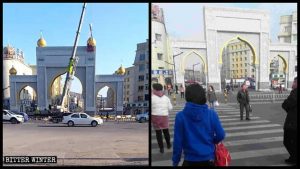
The city’s residents loved the street. According to one of them, the local government spent more than 100 million RMB (14.5 million USD) to transform this food street. However, in January, all of halal food street’s Islamic-style architecture was demolished.
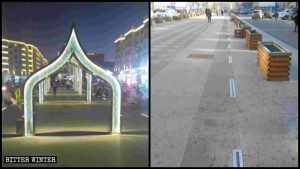
A local government official said: “China is now fully pursuing the ‘sinicization’ of religion. Any signboards with Islamic symbols must be removed. Under the Communist Party’s leadership, everyone must believe in the Communist Party, but not religions. Otherwise, the Communist Party’s dominance will be shaken, which would be unacceptable.”
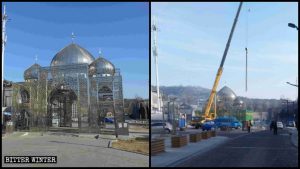
source:BITTER WINTER
